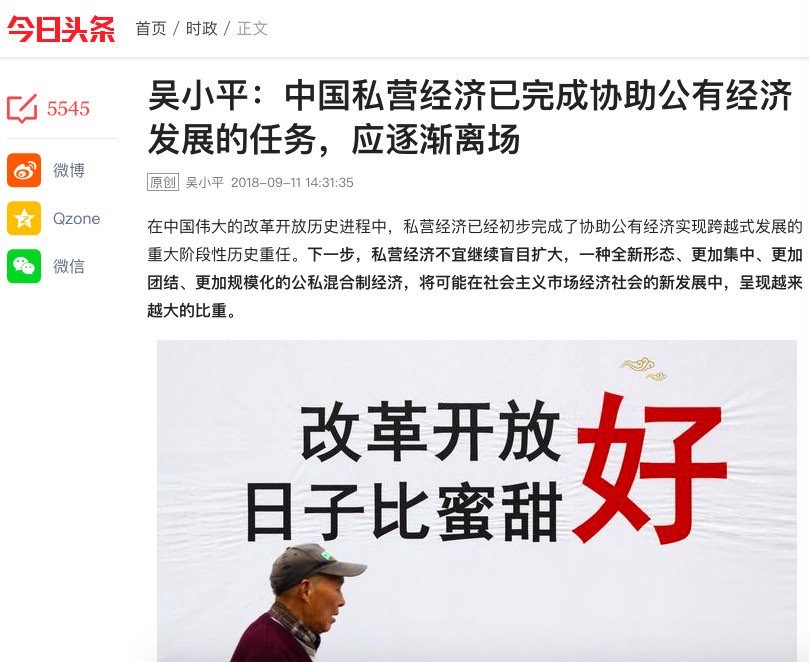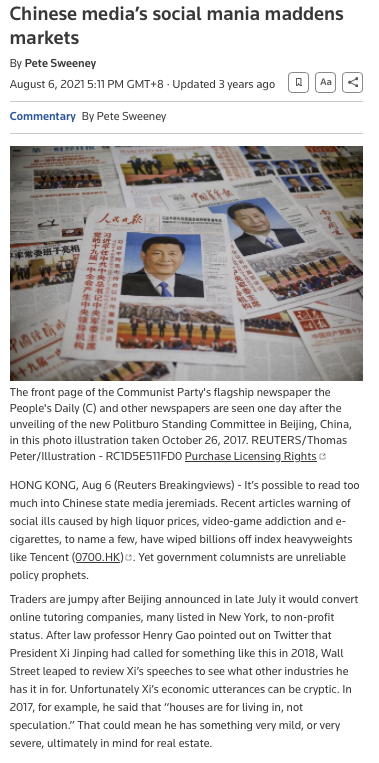In an attempt to save its economy, China published a draft Private Economy Promotion Law today.
Will it save the ailing Chinese economy?
Highly unlikely.
Yet, this Law is still very useful, in that it reveals the many problems plaguing China’s private economy.
Will it save the ailing Chinese economy?
Highly unlikely.
Yet, this Law is still very useful, in that it reveals the many problems plaguing China’s private economy.

1. The very first Article states that the goal of the law is to “promote the healthy development of the private economy”.
But “healthy” according to whom? Should’t the private entrepreneurs be the ones to decide? Why should someone else decide this?
But “healthy” according to whom? Should’t the private entrepreneurs be the ones to decide? Why should someone else decide this?
https://x.com/henrysgao/status/1620776593240264704
The answer is found in Art. 2, which states that the key to the work promoting the development of private economy is to “ensure its correct political direction”.
What then is “correct political direction”?
What then is “correct political direction”?
This is defined in the same article as “insisting on the dominance of the public ownership, with the common development of multiple ownership models, and insisting on the dominance of distribution according to labor, with the co-existence of multiple distribution methods”.
Thus, private economy can only serve as a supplementary model of ownership.
In other words, if the public economy is doing well, then there is no need to develop private economy. Only when the national economy is haemorrhaging that there is a need to develop the private economy
In other words, if the public economy is doing well, then there is no need to develop private economy. Only when the national economy is haemorrhaging that there is a need to develop the private economy
to pump blood into the national economy, just like what happened in 1978.
But even when private economy is allowed, it can only grow according to the visible hand of the government, which, as stated in the the same Article, shall “guide the development of non-public economy”.
But even when private economy is allowed, it can only grow according to the visible hand of the government, which, as stated in the the same Article, shall “guide the development of non-public economy”.
True to the spirit of Das Kapital, the CCP has always been worried by the "barbaric growth" of the capital.
https://x.com/henrysgao/status/1469285483293208576
2. The most interesting part in Article 3 is the last sentence, which states that “private economic organizations enjoy equal legal status, market opportunities and development rights with other types of economic organizations.”
The first two parts on “equal legal status, market opportunities” are not new, but the last emphasis on “equal development rights” is very interesting. It is a veiled reference to the debate sparked by a viral article in 2018, which called for private firms exiting the market 

as they have fulfilled the historic mission of developing the economy.
While the essay led to a quick retort by People’s Daily and a direct response from Xi at a special seminar for private firms 2 months later, it essentially captured the inherent contradiction in Deng’s theory
While the essay led to a quick retort by People’s Daily and a direct response from Xi at a special seminar for private firms 2 months later, it essentially captured the inherent contradiction in Deng’s theory

of “the primary stage of Socialism”, which sees the introduction of non-public ownership as an act of expediency to develop the economy to a high enough level, so that the state can nationalize the wealth and transition to true Socialism.
So when will this happen?
Deng initially set the target at the “middle of the 21st century”, but encouraged by the rapid development of the Chinese economy, Xi in 2021 moved the target date to 2035, or 11 years from now.
Deng initially set the target at the “middle of the 21st century”, but encouraged by the rapid development of the Chinese economy, Xi in 2021 moved the target date to 2035, or 11 years from now.
Thus, even if private firms do get “equal development rights” according to the new Law, they only have at most 11 years to develop, or even shorter if the Law takes longer to enact, which is not unlikely given similar controvery surrounding the Property Law, which took 10 years.
3. So what exactly are the obstacles facing private firms?
They are summarised in the next few chapters, which includes unfair competition from SOEs (Ch. 2), lack of access to credit and finance from state banks (Ch. 3) and lack of IP protection (Ch. 4).
They are summarised in the next few chapters, which includes unfair competition from SOEs (Ch. 2), lack of access to credit and finance from state banks (Ch. 3) and lack of IP protection (Ch. 4).
4. In addition, there are also other problems facing private firms, which, paradoxically, are created by other laws.
These include, for example, the need to establish Party cells within private firms, as per the requirement of the Company Law and further affirmed in Article 34
These include, for example, the need to establish Party cells within private firms, as per the requirement of the Company Law and further affirmed in Article 34
of the draft Law; and the need for private firms to “protect national security and national interests”, as per the requirement of the National Security Law and further affirmed in Article 43 of the draft Law.
5. There are also problems which are simply vestiges of China’s long history of command economy. This is noted by Article 45 of the draft law, which states that
“When state organs formulate laws, regulations, … or make relevant major decisions, they should pay attention to the
“When state organs formulate laws, regulations, … or make relevant major decisions, they should pay attention to the
opinions and suggestions of various economic organizations, industry associations and chambers of commerce, including private firms; before implementation, they should leave the necessary adjustment period according to the actual situation.”
Remember the crackdown on the tuition sector in 2021?
The tutoring companies were never consulted or given time to adjust. They just vaporised overnight based on an off-the-cuff remark from Xi.
The tutoring companies were never consulted or given time to adjust. They just vaporised overnight based on an off-the-cuff remark from Xi.

6. Another major problem is local protectionism, where ambitious local officials would stop at nothing to beat their peers in the game of “who gets promoted first”, including by arresting private businessman involved in business disputes with someone from their locality. This is
prohibited by Articles 61 and 62 of the draft law, but it’s not going to work unless the promotion system is changed.
Yet another related problem is that every new official would try to build some monument by attracting private firms to invest, which are often regarded as
Yet another related problem is that every new official would try to build some monument by attracting private firms to invest, which are often regarded as
white elephants of his succesor who then refuses to honor promises made or deal struck, resulting in the project left languishing. This is address by Article 68, which again is unlikely to solve the problem given that Contract Law simply doesn't apply to the government.
In summary, the very fact that China needs a law to promote private economy is problematic. In this aspect, it is similar to the law on the protection of endangered species, which is often doing too little and too late.
• • •
Missing some Tweet in this thread? You can try to
force a refresh
















